
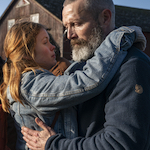 I think RIDERS OF JUSTICE, a Danish film technically released in November 2020, is my favorite movie I’ve seen this year. It plays off of some genre traditions and themes that interest me, but it feels unlike anything I’ve seen before, and it was exciting to discover that as I watched it. So this is one of the reviews where I have to start by suggesting you take my word for it that it’s a truly special movie, stop reading, go watch it, and then come back. But I know most people won’t do that, so I’ll start by explaining what the movie is and warn you before I get into heavy spoiler stuff to analyze the meaning with those who have seen it.
I think RIDERS OF JUSTICE, a Danish film technically released in November 2020, is my favorite movie I’ve seen this year. It plays off of some genre traditions and themes that interest me, but it feels unlike anything I’ve seen before, and it was exciting to discover that as I watched it. So this is one of the reviews where I have to start by suggesting you take my word for it that it’s a truly special movie, stop reading, go watch it, and then come back. But I know most people won’t do that, so I’ll start by explaining what the movie is and warn you before I get into heavy spoiler stuff to analyze the meaning with those who have seen it.
From the description on the box this sounds like a straight up revenge movie, which you know I would be down for. Markus (a heavily bearded Mads Mikkelsen, VALHALLA RISING) is a soldier pulled off duty in Afghanistan to take care of his teenage daughter Mathilde (Andrea Heick Gadeberg) after his wife (Anne Birgitte Lind) dies in a train crash. Then a survivor of the crash tells him it might not have been an accident, so they put together a team of computer experts and try to track down who’s responsible.
That is indeed the basic plot, and Markus does end up using his particular set of skills (mostly shooting) on a whole bunch of people. But I wouldn’t really say that’s what this is about. It’s not even about “Revenge will only make things worse,” even though it does illustrate that and deconstruct some of the relevant tropes pretty thoroughly. But I swear to you it’s something much more thoughtful, complex and soulful than just a revenge or anti-revenge movie, as much as I tend to enjoy those sorts of things.
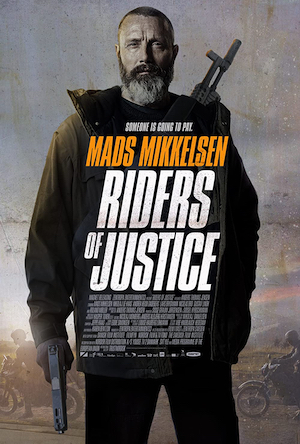
Otto (Nikolaj Lie Kaas, THE IDIOTS) is a statistics expert who, with his two dorky friends, Lennart (Lars Brygmann, THE PROFESSOR AND THE MADMAN) and Emmenthaler (Nicolas Bro, WAR HORSE), has been working on an algorithm that has not impressed their employer and got the team fired. So he’s headed home on an earlier train than usual, a crowded train, when he offers his seat to Markus’s wife Emma. Seconds later the crash happens, the people sitting by that window are killed instantly, and he survives, filled with tremendous guilt. When he finds out one of the people killed in the crash was 13 days away from testifying in a trial against the leader of a biker gang he becomes convinced it was an assassination, and remembers every unusual thing he observed before it happened, convinced he saw the saboteur. The police are not swayed.
So he shows up at Markus’s home with a stack of print outs and stolen data to convince him of his thesis, and before long they’re set up in the barn and at Emmenthaler’s house doing amateur facial recognition scans on hacked security cam footage, trying to ID a guy Otto saw throwing away a whole meal and getting off the train moments before the incident.
But believe it or not, this movie that begins in such tragedy and deals very matter-of-factly with grief and violence is also very funny and quirky. Nervous, wincing Otto and stoic, grimacing Markus are already a huge enough contrast to provide humorous friction, but seeing Mikkelsen glower at the eccentricities of Lennart and Emmenthaler is priceless. There’s alot of dialogue made really funny just through each character’s preoccupations: Lennart is impressed by the size of the barn, and is constantly mentioning it or wanting to move conversations there; Emmanthaler is pissed off that he has to use Lennart’s cheap monitor, and keeps gratuitously bringing up its low resolution; he’s also hung up on the idea that Markus should teach them how to shoot and that they should help kill people, so he’ll bring that up, always trying to play it like he’s just trying to be helpful, not pushing his own agenda of bloodthirst. I also loved Markus’s disbelief at how fast Emmanthaler could assemble a rifle, not through any experience but just an understanding of engineering.
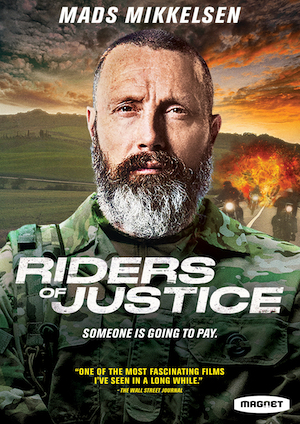
The investigation and revenge plot dig these guys into deeper and deeper trouble, but it usually feels like Markus has it under control. He has a harder time with the escalating lies they’re telling Mathilde to explain why a guy she recognizes from the train and two – then three – other strangers are spending all day every day at the house or in the barn with her dad. As much or more than it’s about confronting dangerous biker dudes it’s about this collection of broken people forming an ersatz family in the process.
Each of these characters has their own issues that they’re dealing with, and we learn about their pasts, and a big part of the joy of the movie is how badass Markus spending time with these nerds and grimacing at the things they un-self-consciously say to him – giving him completely unwanted advice about how to raise his daughter, for example – slowly chips away at his defenses and starts to change him.
A thing here that’s pretty alien to me as an American is how the state offers psychiatrists to Markus and Mathilde to help them deal with their loss. A more familiar one is that Markus turns them down. He’s very polite to them, but it’s clearly a macho thing. He sees no use for them and doesn’t want Mathilde to use them either, acting like she’s being completely ridiculous when she tries to change his mind. I don’t have a background like Markus, but I grew up with that problem of thinking men are supposed to keep all their emotions buried inside, and I still sometimes struggle with it, although I’ve been working on it in recent years. I loved seeing a great screen presence like Mikkelsen dealing with that. It does a great job of making him cool while showing that his machismo is not so much cool as just uptightness. And it hurts not only his daughter, but himself.
This is definitely confronting what we call toxic masculinity, but doing that with great compassion for everyone involved. Markus doesn’t have the capacity to deal with certain things in a healthy way. If he doesn’t shut down, he blows up. Otto and Mathilde’s boyfriend Sirius (Albert Rudbeck Lindhart), who’s un-self-consciously into cooking and talking about emotional problems and other things that are outside of Markus’s idea of masculinity, are both assaulted by Markus. Both forgive him, though, and that’s so outside his experience that it bends him toward their points-of-view.
I think the most important theme is the idea of causality. In his work Otto studies complex patterns of cause and effect. He argues that things that seem like coincidences can be explained as part of a series of events if enough data points are filled in. Of course after surviving this tragedy he can’t help but obsess over the what-ifs. He knows if he’d stayed in his seat rather than offering it to Emma, that he would’ve died instead of her, so Markus would still have his wife and Mathilde would still have her mom. And Otto doesn’t feel he deserved to be the one who lived – not just because of standard survivor’s guilt, but also for reasons we’ll learn later (getting more spoilery here), past events that bring up other obvious what-ifs, where things would’ve been better if he’d made better choices. Paradoxically, it seems to have been those tragic mistakes that led him on the path to becoming the type of guy who would offer his seat to a stranger on the train. Kindness that ends up being fatal.
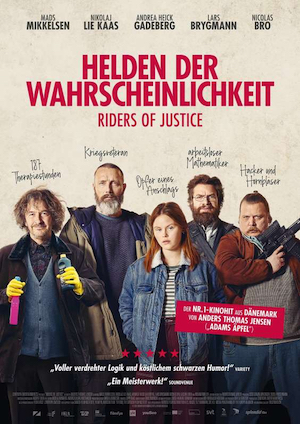
Mathilde’s thinking is similar. On her wall she has sort of a chart made of Post-It notes, showing the series of random occurrences that led to her and her mom being on that train. Her bike got stolen, so her mom was giving her a ride. But the car broke down, so they decided to take the train. It’s an interesting theme for a revenge movie. According to Markus’s plan, if he kills the people whose sabotage caused Emma’s death, that’s some sort of justice. So why shouldn’t Mathilde go after the person who stole her bike, leading to her getting in the car with her mother, leading to her mother getting on the train? She’s wise enough not to do that, but we know from a framing story that the theft itself was triggered by a little girl asking a shopkeeper if he has a certain bike in blue. The shopkeeper makes a call and his guys spot Mathilde’s bike and take it. So what are you gonna do, get revenge on the little girl?
One of the beautiful things about the movie (BEAUTIFUL THINGS ABOUT THE MOVIE SPOILERS) is how many of their terrible mistakes also lead to good things. A huge coincidence leads to them killing the wrong guy, but also freeing a young sex trafficking victim (Gustav Lindh, THE NORTHMAN). At first taking him to the house to prevent him from telling anyone what he witnessed, he soon acts as an au pair, becoming an important contributor to this newly formed family and living the lifestyle he was seeking when he came to this country in the first place. Likewise, these people all meet because of a tragedy, and then an incorrect assumption when trying to deal with the tragedy. Otto randomly took away Mathilde’s mom by offering his seat to her, but he also gave her back her father by teaching him to finally open up about his feelings and seek help.
FULL-ON ENDING SPOILERS: Things get bloody and it really seems like it’s gonna end on a bummer, or on ambiguity, and it might’ve gotten away with it. But I was so glad to see the happy ending where they’re not only alive, but celebrating Christmas together. And maybe I say this sort of thing too much but I gotta tell you, when I saw the gift that Markus got for Emmanthaler – not only an act of kindness to bring him real happiness, but evidence that he’s accepting the value of exploring and dealing with one’s psychological hang-ups – that shit made me cry. It’s a movie about a terrible tragedy, but it gave me a happy cry. This is a great fucking movie.
It’s written and directed by Anders Thomas Jensen, who has done some other movies with Mikkelsen and other members of this cast, including the well-regarded MEN & CHICKEN (2015). And I guess he’s one of the four writers credited on THE DARK TOWER? That’s weird. Anyway I feel like I should watch those other ones because this guy is obviously a genius, but also I’m afraid to because I can’t imagine they could live up to this one! If you’ve seen them let me know what you think.
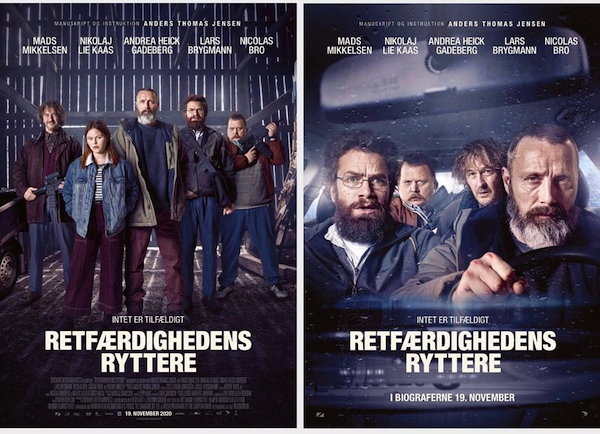


























September 20th, 2021 at 7:14 am
Mads gives about a two minute speech to his daughter about the nature of death, and “what it all really means” that I wound up recording on my phone it was so ball-bustingly great.